The International Court of Justice (ICJ) is likely to order Israel to take some provisional measures to reduce the suffering of the residents of Gaza, as requested by South Africa in the case it brought to the court last week accusing Israel of violating the Genocide Convention.
But it is less certain that the 17 judges will order the provisional measure that matters most — an immediate halt to Israel’s military assault on Gaza.
This is the view of several lawyers, diplomats and experts. The ICJ judges have until 5 February to announce any provisional measures they might decide upon, Daily Maverick was told.
They could announce them as early as this week, but legal sources say they will probably take the full 24 days because of the great seriousness and difficulty of this case. The judges began deliberating on Monday.
The nationalities of the judges could be decisive in any ruling. Although they are all supposed to act objectively as individuals, most observers believe that in practice they follow the orders of their capitals. Israel suspects this will count against it, though that is by no means certain.
After announcing provisional measures, if any, the court will then ponder the substance of the case, to determine conclusively whether or not Israel is carrying out genocide in Gaza. That could take years.
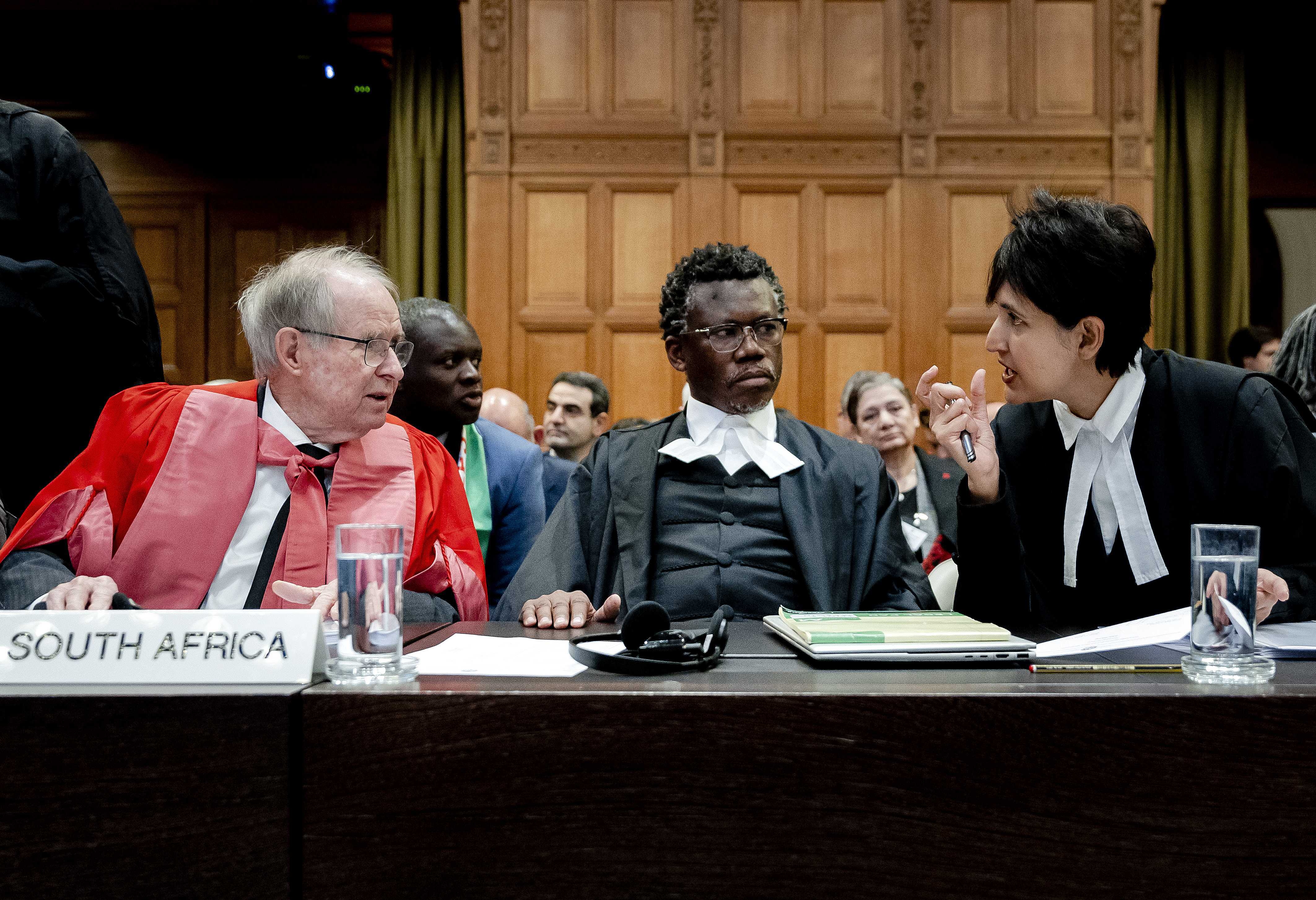 John Dugard, professor of International Law, lawyer Tembeka Ngcukaitobi and lawyer Adila Hassim, sit ahead of the hearing of the genocide case against Israel brought by South Africa, at the International Court of Justice in The Hague, The Netherlands, on 12 January 2024. (Photo: EPA-EFE/ Remko De Waal)
John Dugard, professor of International Law, lawyer Tembeka Ngcukaitobi and lawyer Adila Hassim, sit ahead of the hearing of the genocide case against Israel brought by South Africa, at the International Court of Justice in The Hague, The Netherlands, on 12 January 2024. (Photo: EPA-EFE/ Remko De Waal)
The case
Last week, the ICJ judges heard testimony by South African lawyers arguing that Israel was committing genocide against the 2.3 million people of Gaza by killing more than 23,000 of them, severely wounding thousands more and making conditions of life impossible for all of them.
The lawyers also cited statements by Israeli Prime Minister Benjamin Netanyahu, President Isaac Herzog and many other senior officials, soldiers and even singers calling for the destruction of Gaza and blaming all Gazan citizens for the atrocities of Hamas on 7 October when it attacked Israel. The SA lawyers said the indiscriminate destruction of civilians and civilian infrastructure and the statements by top officials demonstrated Israel’s genocidal intent.
South Africa asked the judges to issue several provisional measures, the main one being for Israel “to immediately suspend its military operations in and against Gaza”. SA also asked the court to order Israel to stop committing genocide against the Palestinians, including by desisting from:
- Killing them and causing them serious bodily or mental harm;
- Deliberately inflicting on them conditions calculated to bring about their physical destruction in whole or in part; and
- Imposing measures intended to prevent births within the group.
Read more in Daily Maverick: ‘Nothing will stop this suffering, except an order from this court’ — SA sets out the evidence against Israel
Israel’s lawyers denied that Israel was committing genocide in Gaza.
They said an armed conflict between Israel and Hamas was taking place in Gaza, not a genocide, and accused South Africa of presenting a distorted picture of the conflict as though Israel was the only party fighting in Gaza.
They placed a great deal of emphasis on the Hamas attack on Israel on 7 October in which about 1,200 people, mostly civilians, were killed and 240 hostages taken and said Israel was fighting a war of self-defence against Hamas in Gaza.
They rejected the provisional measures sought by South Africa. In particular, they said a ceasefire by Israel would be unilateral, allowing Hamas to continue fighting and leaving Israel defenceless. They dismissed the statements by Netanyahu and others as “rhetoric” and said they did not reflect the collective views of the war Cabinet and National Security Council which were directing the war.
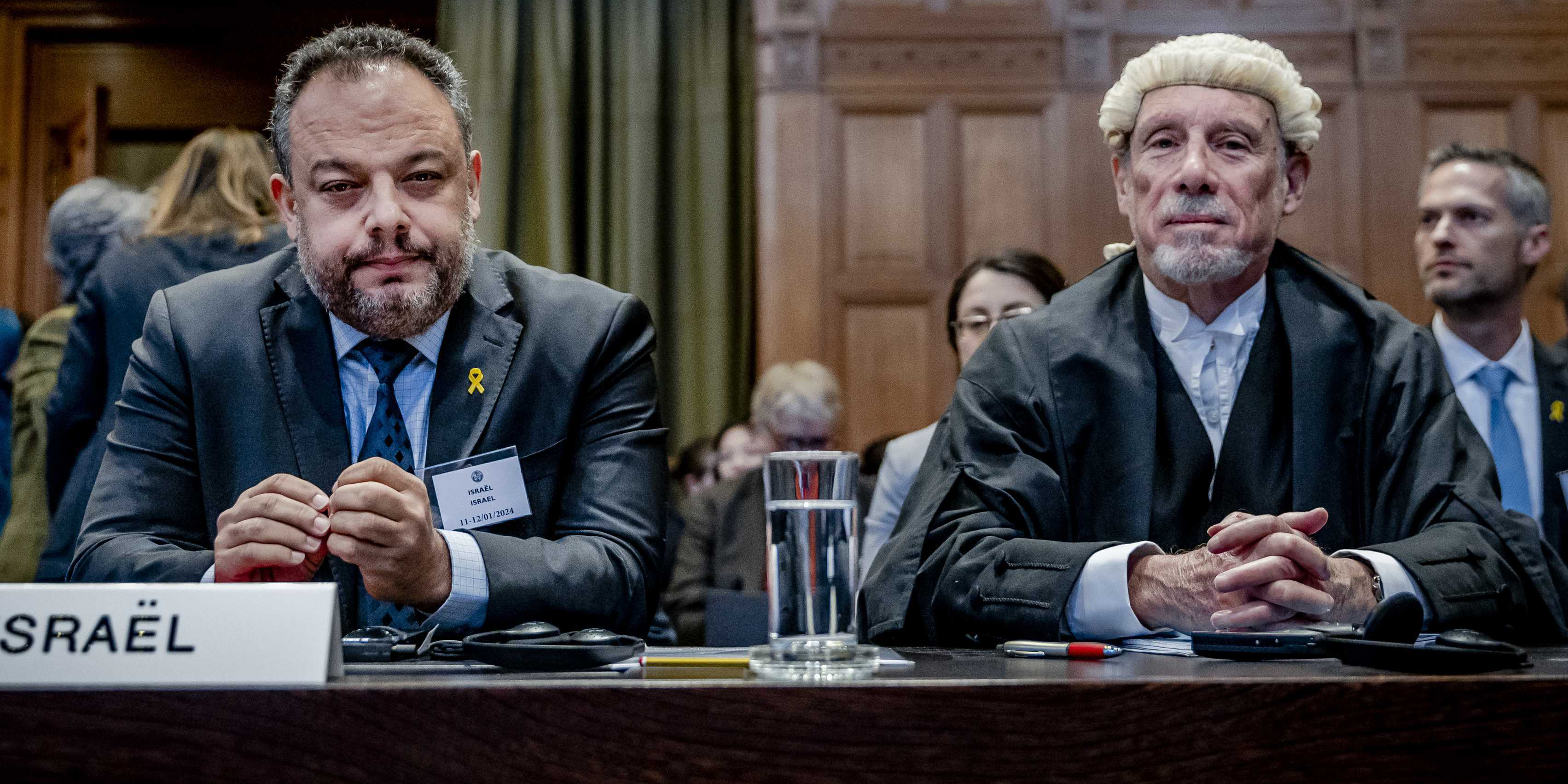 Tal Becker (left), Legal Counselor of Israel's Foreign Ministry, and lawyer Malcolm Shaw, prior to the hearing of the genocide case against Israel, brought by South Africa, at the International Court of Justice in The Hauge, The Netherlands, on 11 January 2024. (Photo: EPA-EFE/ Remko De Waal)
Tal Becker (left), Legal Counselor of Israel's Foreign Ministry, and lawyer Malcolm Shaw, prior to the hearing of the genocide case against Israel, brought by South Africa, at the International Court of Justice in The Hauge, The Netherlands, on 11 January 2024. (Photo: EPA-EFE/ Remko De Waal)
Read more in Daily Maverick: Israel says ICJ order, if granted, would leave it defenceless against Hamas
William Schabas, a Canadian international law professor, lawyer and veteran litigator before the ICJ, said he gave SA’s lawyers an A for their performance last week and Israel a C-minus — “and that’s because I don’t like to fail anyone”.
https://www.youtube.com/watch?v=HVV8adzzcH8
‘Feel-good’ measures
Nevertheless, he suggested, the ICJ judges might opt to order only “feel-good” measures for Israel — such as “not to commit genocide” rather than ordering the most effective measure of demanding that Israel immediately cease its military assault on Gaza.
Schabas said, “The ultimate measure would be an order to stop all military activity, and if they get that one that will be total victory.”
But he told the French activist Frank Barat on Barat’s YouTube show, that it would be hard for the judges to order Israel to stop all military activity “because of the self-defence argument”.
However, it would also be hard for the ICJ judges to reject South Africa’s request for other provisional measures such as ordering Israel to allow much greater access to food, water, medication and other humanitarian aid in Gaza.
“And that’s a strong case and one they’re very likely to get.”
Such measures would still affect Israel because they would be viewed in the court of public opinion as being orders against the State of Israel.
Other lawyers have pointed out that any ICJ provisional order against Israel would imply that the court believed there was a prima facie case of genocide against Israel.
Germany last week announced that it would formally intervene on Israel’s side in the substantive stage of the genocide case at the ICJ. Even so, sources close to the German embassy in Pretoria told Daily Maverick they believed that although the ICJ would probably not grant SA every provisional measure it requested, it would probably order something “going in the direction of … a ceasefire, an end (or pause) of hostilities and access to humanitarian aid”.
Israel would, of course, prefer no provisional measures but it believes it is unlikely that the ICJ will completely decline to take on the case at all. If the ICJ does accept the case, Israel is hoping for easier measures like “a call for ensuring more humanitarian aid and protection of civilians but short of a call for an immediate ceasefire”, a former Israeli diplomat told Daily Maverick.
But, he added, Israel was not completely ruling out the possibility of the ICJ ordering a ceasefire — because of the national composition of the court.
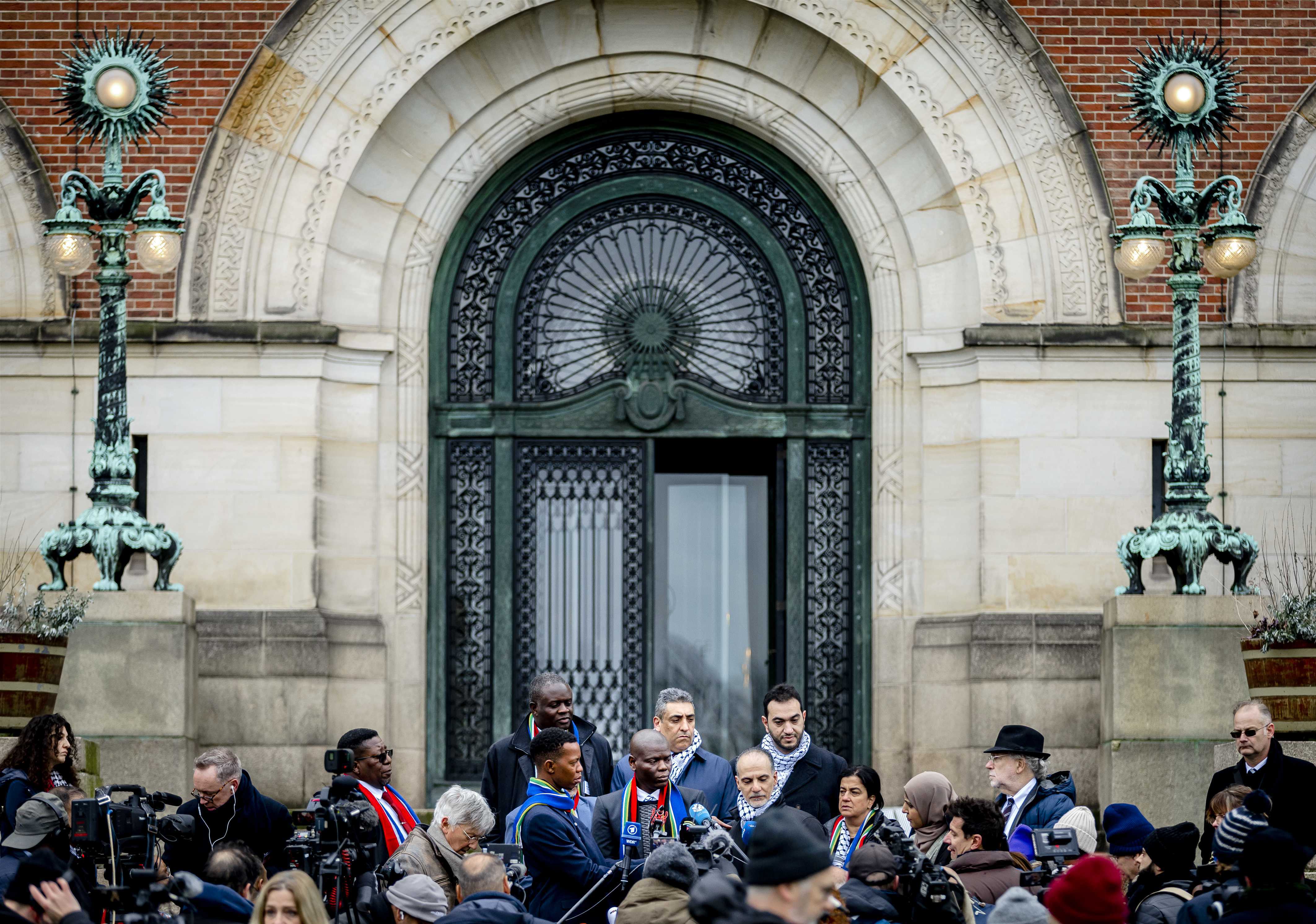 Ronald Lamola (centre), Minister of Justice of South Africa, speaks to the press before the International Court of Justice after the first day of the hearing of the genocide case against Israel, brought by South Africa, in The Hauge, The Netherlands, on 11 January, 2024. (Photo: EPA-EFE/ Remko De Waal)
Ronald Lamola (centre), Minister of Justice of South Africa, speaks to the press before the International Court of Justice after the first day of the hearing of the genocide case against Israel, brought by South Africa, in The Hauge, The Netherlands, on 11 January, 2024. (Photo: EPA-EFE/ Remko De Waal)
The ‘uncertain’ judges
Although the judges are supposed to act as independent individuals, most commentators predict they will vote according to the positions of their governments
Israel puts the judges from Morocco, Somalia, Lebanon, China, Russia and South Africa’s ad-hoc judge in the South African column.
It puts the judges from the US, Australia, Germany and its ad-hoc judge in its column. This leaves Japan, Slovakia, Brazil, India, Jamaica, Uganda and France, whose judge, Israel says, is originally from Egypt, “to play for”.
Israel fears that this national breakdown of judges favours SA, though it appears that the “uncertains” could swing it either way.
Daniel Levy, of the US-Middle East Project, told Newzroom Afrika that given the national composition of the court, and the fact that its president was American, “I think there will be a predisposition among many of the judges to see this through the lens of: this is a terrorist organisation against a state which is trying to act in its legitimate self-defence”.
Read more in Daily Maverick: Middle East crisis news hub
Cathleen Powell, UCT professor of international law, also speaking on Newzroom Afrika, said one of the strongest arguments Israel had made last week was that Hamas was not before the court and so if the ICJ issued an order to Israel to stop fighting that would leave it defenceless against Hamas, which would be able to continue fighting.
She said, however, that the ICJ should at least order Israel to provide or allow much greater humanitarian access. She agreed with Levy that many of the humanitarian improvements which Israel had cited before the ICJ last week were fairly recent and may well have been in response to South Africa’s court case.
Levy suggested that if this were so it would mean that SA had already begun saving lives in Gaza with its ICJ case, no matter how it turned out.
Powell added while the Israeli lawyers talked about how well they were cooperating with the UN and others, the UN and its aid agencies “frequently complained that Israel was making it impossible for them to work within the territory”.
Powell believed the ICJ should take up the case if only to objectively test Israel’s claim that almost all the death and destruction in Gaza was being caused by Hamas — by using civilians as human shields, setting booby traps, misfiring rockets, etc.
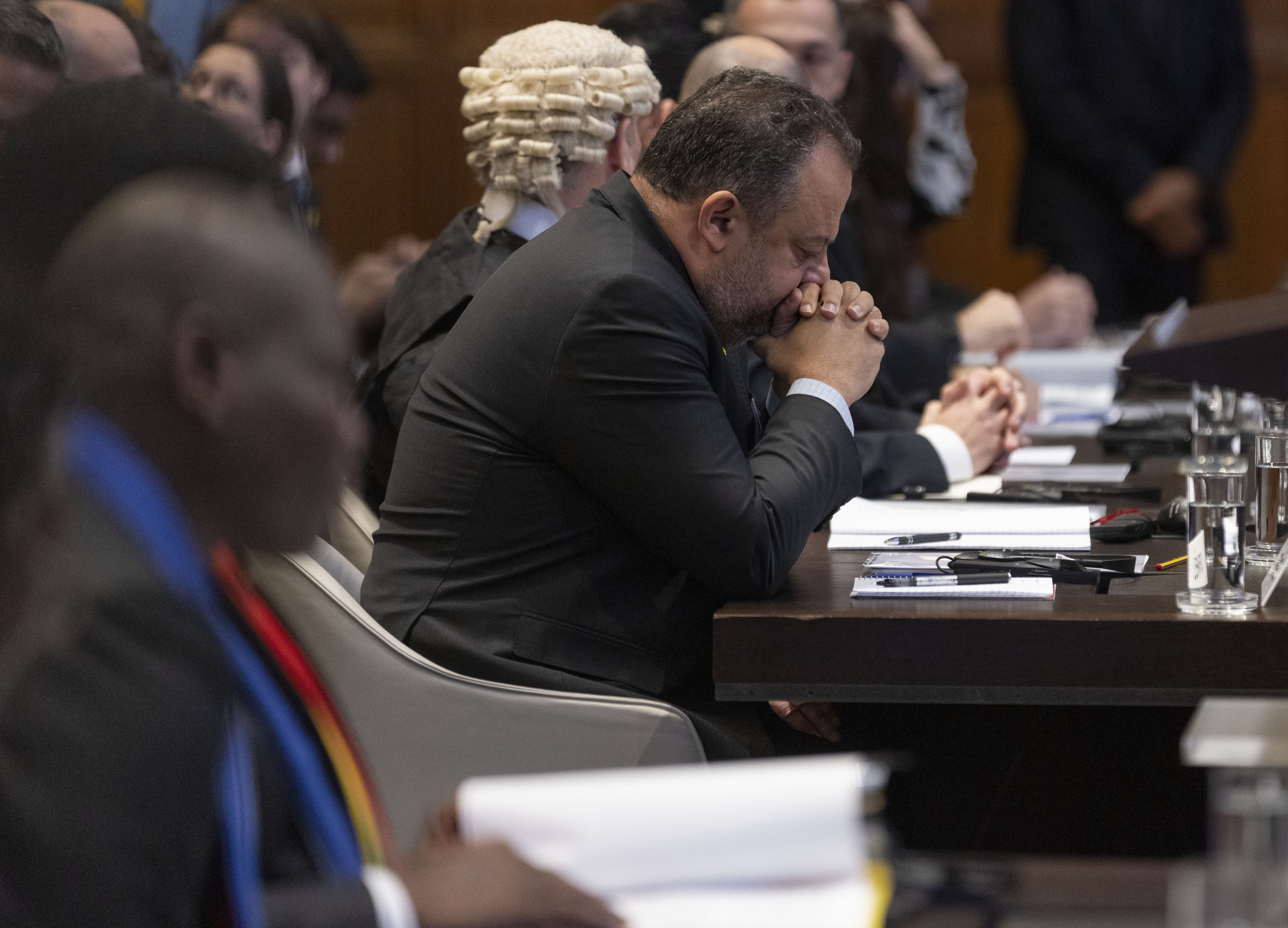 Israeli legal counsellor Tal Becker looks down and South African Justice Minister Ronald Lamola sits in the foreground at the International Criminal Court on 11 January, 2024 in The Hague, Netherlands. (Photo: Michel Porro/Getty Images)
Israeli legal counsellor Tal Becker looks down and South African Justice Minister Ronald Lamola sits in the foreground at the International Criminal Court on 11 January, 2024 in The Hague, Netherlands. (Photo: Michel Porro/Getty Images)
Proof of dispute
Powell and Levy cautioned that the ICJ might refuse to adjudicate the case on the technical grounds that SA had failed to prove it had a dispute with Israel before resorting to the ICJ — as ICJ rules require it to.
Israel’s advocate Malcolm Shaw suggested SA’s Department of International Relations and Cooperation (Dirco) had bungled this requirement by ignoring several requests by Israel to discuss SA’s genocide allegations before Pretoria took its case to the ICJ on 29 December last year.
In particular, he said SA’s claim that Israel had failed to respond to an official note from Pretoria on 21 December raising its concerns about genocide in Gaza was incorrect as Israel had responded on the same day. And on 26 December the head of Israel’s foreign ministry had proposed a meeting with his SA counterpart to discuss SA’s allegation. Dirco had the next day refused to accept a handwritten letter from the Israeli embassy because it was a holiday. Pretoria then submitted its application to the ICJ on 29 December while still in correspondence with Israel.
A South African diplomatic source dismissed Shaw’s argument, saying that SA believed it had been able to demonstrate in many ways that it had a dispute with Israel over Gaza. He mentioned, for instance, a request that Pretoria had made to Israel on 17 October for a phone call between President Cyril Ramaphosa and Netanyahu.
“Israel did not reply to this request,” he said.
Andre Thomashausen, Unisa emeritus professor of comparative and international law, said the ICJ would probably throw SA’s case out — and issue no provisional measures — not only because of this failure to prove that it had a dispute with Israel but also because he said South Africa had failed to prove Israel had genocidal intent in its attack on Gaza.
He told Jeremy Maggs on Moneyweb that he believed South Africa had failed to refute Israel’s case that it had done a lot to mitigate civilian casualties and suffering and to restrict the harm to Hamas. He concluded, “Essentially, the court will have to say, you’ve approached us with a very serious crisis but you’ve based it on the wrong legal foundation. The genocide foundation can’t help you here.”
Meanwhile, Netanyahu appeared to have rendered the whole exercise as academic by vowing on Saturday to continue the war in Gaza regardless of what the ICJ decided. DM
Read more in Daily Maverick: Middle East crisis news hub




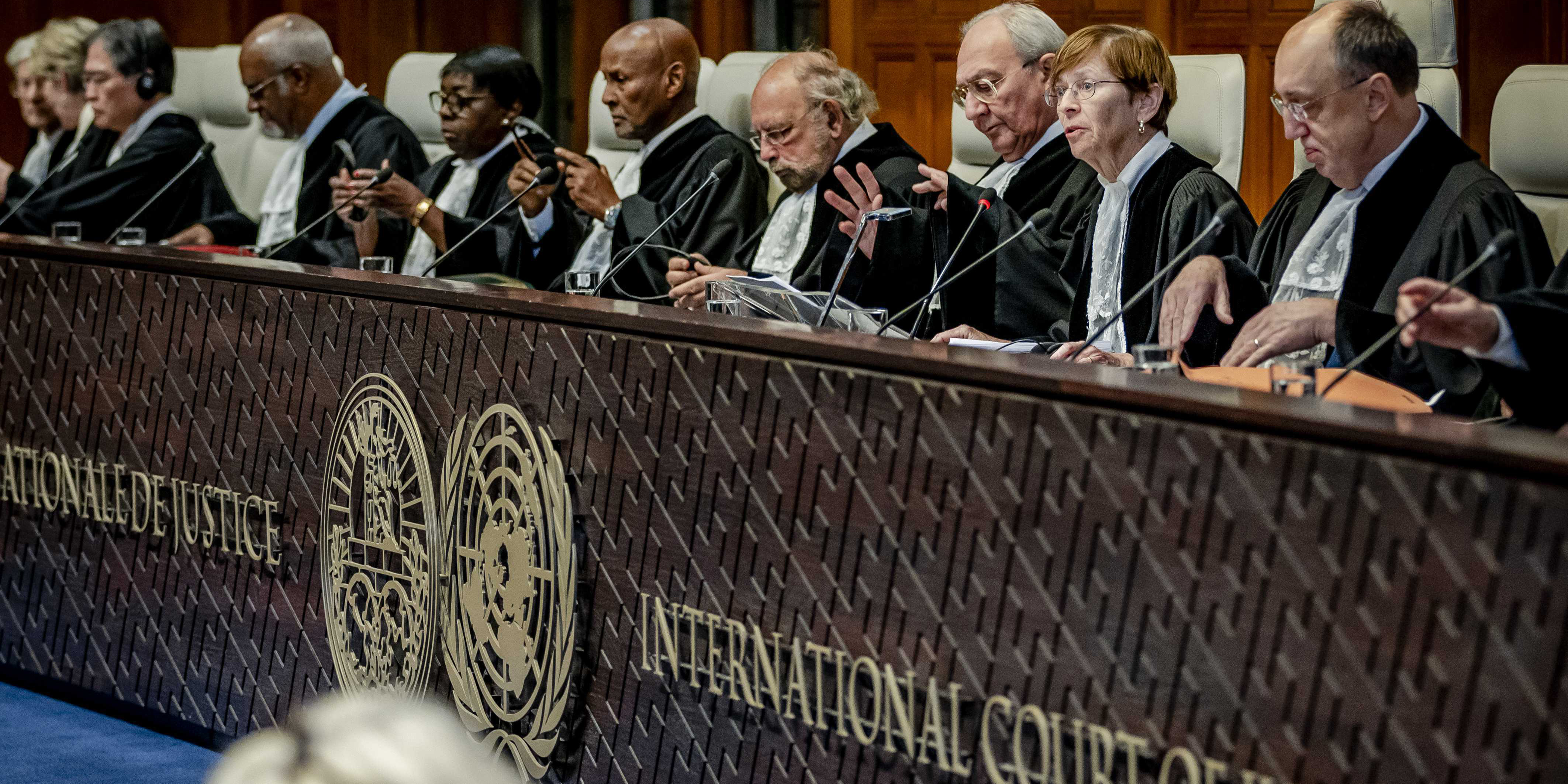 Israeli legal counsellor Tal Becker looks down and South African Justice Minister Ronald Lamola sits in the foreground at the International Criminal Court on 11 January, 2024 in The Hague, Netherlands. (Photo: Michel Porro/Getty Images)
Israeli legal counsellor Tal Becker looks down and South African Justice Minister Ronald Lamola sits in the foreground at the International Criminal Court on 11 January, 2024 in The Hague, Netherlands. (Photo: Michel Porro/Getty Images) 